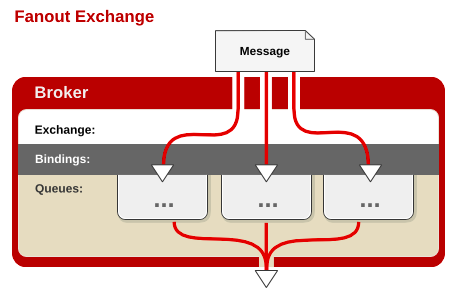6、RabbitMQ-路由模式
Exchange(交换机 转换器)
Exchange分发消息时根据类型的不同分发策略有区别,
目前共四种类型:direct、fanout、topic、headers 。
一方面是接受生产者的消息,一方面是向队列推送消息
basicPublish(String exchange, String routingKey, BasicProperties props, byte[] body) throws IOException
queueBind(String queue, String exchange, String routingKey) throws IOException
“”匿名转发
fanout:不处理路由键
每个发到 fanout 类型交换器的消息都会分到所有绑定的队列上去。fanout 交换器不处理路由键,
只是简单的将队列绑定到交换器上,每个发送到交换器的消息都会被转发到与该交换器绑定的所有
队列上。很像子网广播,每台子网内的主机都获得了一份复制的消息。fanout 类型转发消
息是最快的。

direct:
消息中的路由键(routing key)如果和 Binding 中的 binding key 一致,
交换器就将消息发到对应的队列中。路由键与队列名完全匹配,
如果一个队列绑定到交换机要求路由键为“dog”,则只转发 routing key
标记为“dog”的消息,不会转发“dog.puppy”,也不会转发“dog.guard”等等。
它是完全匹配、单播的模式

topic:
topic 交换器通过模式匹配分配消息的路由键属性,将路由键和某个模式进行匹配,此时队列需要绑
定到一个模式上。它将路由键和绑定键的字符串切分成单词,这些单词之间用点隔开。它同样也会识
别两个通配符:符号“#”和符号“*”。#匹配0个或多个单词,*匹配一个单词

路由模式
http://www.rabbitmq.com/tutorials/tutorial-four-java.html
1、模型

2、代码实践
生产者
import java.io.IOException; import java.util.concurrent.TimeoutException; import com.rabbitmq.client.Channel; import com.rabbitmq.client.Connection; import com.rabbitmq.util.ConnectionUtils; public class Send { private static final String EXCHANGE_NAME = "exchange_routing_direct"; public static void main(String[] args) throws IOException, TimeoutException { Connection conn = ConnectionUtils.getConnection(); Channel channel = conn.createChannel(); //exchange channel.exchangeDeclare(EXCHANGE_NAME, "direct"); String msg = "hello direct"; //绑定路由 String routingKey = "error"; channel.basicPublish(EXCHANGE_NAME, routingKey, null, msg.getBytes()); channel.close(); conn.close(); } }
消费者1:
import java.io.IOException; import java.util.concurrent.TimeoutException; import com.rabbitmq.client.Channel; import com.rabbitmq.client.Connection; import com.rabbitmq.client.Consumer; import com.rabbitmq.client.DefaultConsumer; import com.rabbitmq.client.Envelope; import com.rabbitmq.client.AMQP.BasicProperties; import com.rabbitmq.util.ConnectionUtils; public class Receive { private static final String QUEUE_NAME="test_route"; private static final String EXCHANGE_NAME = "exchange_routing_direct"; public static void main(String[] args) throws IOException, TimeoutException { Connection conn = ConnectionUtils.getConnection(); Channel channel = conn.createChannel(); //队列声明 channel.queueDeclare(QUEUE_NAME, false, false, false, null); channel.basicQos(1); //绑定队列到交换机转发器 String routingKey = "error"; channel.queueBind(QUEUE_NAME, EXCHANGE_NAME, routingKey); //定义一个消费者 Consumer consumer = new DefaultConsumer(channel){ //收到消息就会触发这个方法 @Override public void handleDelivery(String consumerTag, Envelope envelope, BasicProperties properties, byte[] body) throws IOException { String msg = new String(body,"utf-8"); System.out.println("消费者1接收到的消息" + msg); try { Thread.sleep(1500); } catch (InterruptedException e) { e.printStackTrace(); }finally{ System.out.println("消费者1处理完成!"); //手动回执 channel.basicAck(envelope.getDeliveryTag(), false); } } }; //监听队列 //自动应答false boolean autoAck = false; channel.basicConsume(QUEUE_NAME, autoAck, consumer); } }
消费者2:
import java.io.IOException; import java.util.concurrent.TimeoutException; import com.rabbitmq.client.Channel; import com.rabbitmq.client.Connection; import com.rabbitmq.client.Consumer; import com.rabbitmq.client.DefaultConsumer; import com.rabbitmq.client.Envelope; import com.rabbitmq.client.AMQP.BasicProperties; import com.rabbitmq.util.ConnectionUtils; public class Receive2 { private static final String QUEUE_NAME="test_queue"; private static final String EXCHANGE_NAME = "exchange_routing_direct"; public static void main(String[] args) throws IOException, TimeoutException { Connection conn = ConnectionUtils.getConnection(); Channel channel = conn.createChannel(); //队列声明 channel.queueDeclare(QUEUE_NAME, false, false, false, null); channel.basicQos(1); //绑定队列到交换机转发器 //可以同时绑定多个 channel.queueBind(QUEUE_NAME, EXCHANGE_NAME, "error"); channel.queueBind(QUEUE_NAME, EXCHANGE_NAME, "info"); channel.queueBind(QUEUE_NAME, EXCHANGE_NAME, "warning"); //定义一个消费者 Consumer consumer = new DefaultConsumer(channel){ //收到消息就会触发这个方法 @Override public void handleDelivery(String consumerTag, Envelope envelope, BasicProperties properties, byte[] body) throws IOException { String msg = new String(body,"utf-8"); System.out.println("消费者2接收到的消息" + msg); try { Thread.sleep(1500); } catch (InterruptedException e) { e.printStackTrace(); }finally{ System.out.println("消费者2处理完成!"); //手动回执 channel.basicAck(envelope.getDeliveryTag(), false); } } }; //监听队列 //自动应答false boolean autoAck = false; channel.basicConsume(QUEUE_NAME, autoAck, consumer); } }
此时的测试只有在error的情况下两者均可收到信息
在其他的模式下只有消费者2可以获取消息





